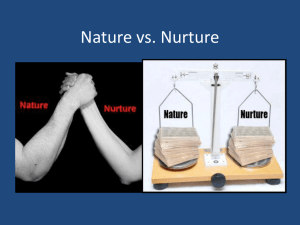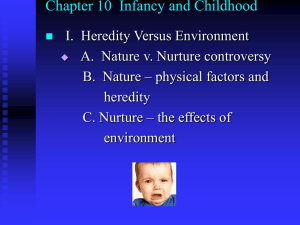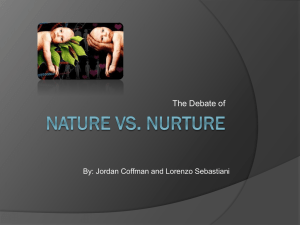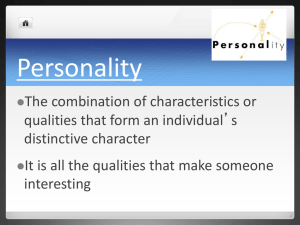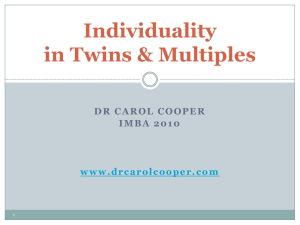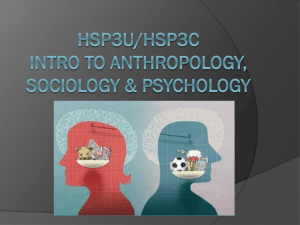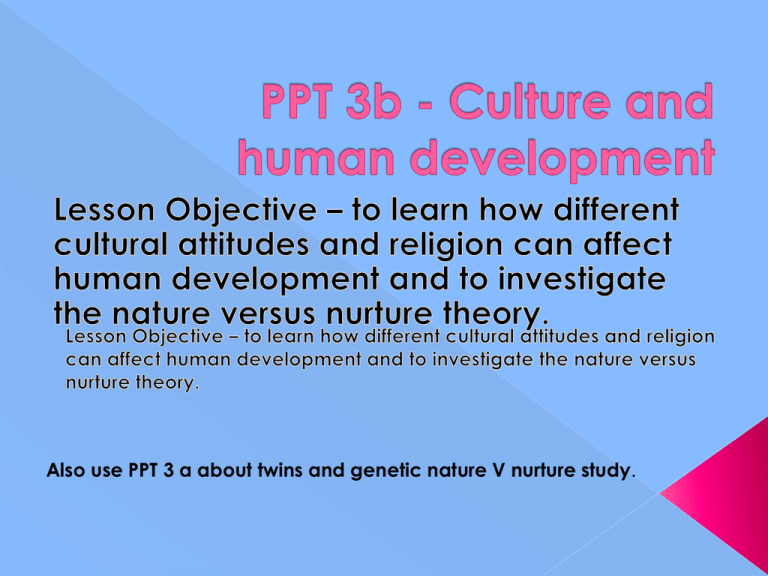
Also use PPT 3 a about twins and genetic nature V nurture study.
1.
2.
3.
4.
5.
6.
Make a list of as many activities that you have carried out
on your own when you were going through the childhood life
stage.
Now compare these with each others.
Do any of you practice a religion?
Do any of you look after younger brothers and sisters?
Do any of you carry out household domestic tasks for your
parents?
How much time do you spend on your own completing tasks,
hobbies, socialising, and compare this with the amount of
time you spend with your parents (doing the same.
What have you noticed?
Now compare your life style
with other cultures!
. "All children grow as members of
cultural communities," said Rogoff,
an expert on learning and
development who holds the UC
Santa Cruz Foundation Chair in
Psychology. "So understanding how
childhood is supported, constrained,
and constructed in any community
is part of understanding child
development."
The very notion of familiar
developmental "milestones,"
such as the ability to sleep
independently, walk and read by
certain ages, and "move away
from home" in early adulthood,
reflects European middle-class
culture.
The UK is a highly age-segregated society,
with children spending much of their time
away from the activities of adults. That
segregation removes children from
important opportunities to observe and
learn from elders by participating in valued
community activities, said Rogoff. In
communities that are age-segregated,
childhood is often viewed as 'preparation'
for later entry into the adult world, she
noted. Adults arrange for children's
involvement in exercises--in school or at
home--to prepare for community
involvement in adulthood.
. If you want an example of the official “conspiracy of silence” that has
allegedly allowed hundreds of vulnerable white girls in some towns to
be abused by Asian men, the case of Ajmal Mohammed, a 43-yearold from Blackburn, might seem to be it. In 2004, Mohammed, an
amateur cricketer in the Ribblesdale league, took a schoolgirl to a
Manchester hotel room and got her drunk – to celebrate, he said, her
14th birthday. The child ran away. Police were called, but he denied
having sex with her and they issued him with a “child abduction
warning letter”. He was never prosecuted.
Two years later, Mohammed took another 14-year-old to a hotel room,
this time in Blackpool – and this time he raped her. When the police
came for him, they found the numbers of six other vulnerable
youngsters on his mobile phone.
In industrial towns across the North and the Midlands, over the past
three years, at least 51 people have been convicted in trials involving
groups of men who have picked up young girls for sexual exploitation.
Forty-eight of the offenders were Asian; the vast majority of the victims
were white. Last week, in Derby, nine men, eight of them Asian, were
sentenced for their parts in a gang that groomed, sexually exploited
and in some cases raped 27 local children, 22 of them white.
The issue exploded on to the national agenda on Friday after Jack
Straw, the former Home Secretary who is also MP for Blackburn, said
that in his town, some Pakistani men saw white girls as “easy meat”.
There was, he said, “a specific problem of Pakistani-heritage men who
target vulnerable young white girls, and we need to get the Pakistani
community to think much more clearly about why this is going on and
about the problems that are leading to a number of Pakistani-heritage
men thinking it’s OK to target white girls in this way”.
A Channel 4 documentary on the subject in 2004 was pulled at the
request of police. Few experts were willing to talk openly yesterday.
Yet as early as 2006, Blackburn’s local paper, the Lancashire Telegraph, launched a “Keep Them Safe” campaign to make
the authorities tackle what it called “sexual grooming and abduction […] which predominantly involves Asian men”. In
article after article, the paper charted locals’ frustration at officialdom’s reluctance to get involved: in 2007, it reported, the
parents of some victims even threatened to sue the police for their failure to act. The editor, Kevin Young, said: “This is an
extremely sensitive subject, and the Telegraph gave it a lot of consideration before launching its campaign.”
In response, in 2008, Lancashire police and Blackburn social services set up Operation Engage. By March last year, it had
offered protection to some 385 girls and young women. Similar operations have sprung up in Preston and other nearby
towns. Some schools in East Lancashire now offer their female pupils lessons in “how to spot a sexual groomer”.
There could, of course, hardly be a more emotive story than this. Sexual abuse! White girls! Pakistani men! Politically-correct
establishment letting it all happen! No wonder the BNP has been licking its lips (though, unfortunately for them, the only two
white Blackburn people recently convicted of this crime, in November 2008, turned out to be members of the party).
Yet just because the BNP exploits an issue, does not mean there is nothing in it. The questions really should be: is it simply a
local problem in those towns? What, if any, wider weaknesses does it expose in Britain’s Muslim communities? And what, if
any, wider weaknesses does it expose in Britain’s governing class?
Sadly for the racists, the figures just do not support any attempt to paint British Muslims and Asians as sex predators on a
national scale. Asians are, in fact, under-represented among sex offenders. As at June 2009, there were 7,021 British men in
prison for sex crimes, of whom only 234 were Asian. That is 3.3 per cent, rather less than the proportion of Asians in the
population. And a 2008 study by Malcolm Cowburn of Sheffield Hallam University found that jailed sex criminals from ethnic
minorities were less likely to have abused children than white sex offenders.
Haras Rafique, of the Centri counter-extremism think tank, says: “There is a problem, a massive problem, but I don’t think it’s
confined to Pakistani communities. It only appears to be a bigger problem with immigrants because immigrants are more
visible.”
And not just because of their skin colour. Asians do not commit more sex crimes, but they do, perhaps, commit different sorts
of sex crimes. White child abusers are more likely to find and groom their victims in private, on the internet. The evidence
suggests that Asian abusers are more likely to find and groom their victims in public, on the street.
Human development
theories: windows on culture
By Robert Murray Thomas
Case study – 21 year old Joseph and 15 year old
Roberta
Key words – nationality, region, locality, ethic background,
gender, religious affiliation, occupation, level of education, age,
social class, fraternal association, recreational pursuits, athletic
team, political preferences and many more.
"we all have our own idiosyncratic gestures"; "Michelangelo's highly idiosyncratic style of painting"
Scenario 1 - Teresa’s parents
come from a lower working
class background, the mother
is a clearer and the father is
ling-term unemployed. Neither
has any educational
qualifications. What does that
make you think about Teresa's
chances of becoming a
Doctor.
Scenario 2 - Now suppose
Teresa's parents come from a
upper middle class
background. They are wealthy
and one is a famous surgeon,
the other a child psychologist.
How likely is it that Teresa will
become a doctor?
Scenario 3 – suppose Teresa's lower working class parents were both
killed in a tragic accident straight after her birth – and she was then
adopted by the upper middle class parents. How do you see her future
prospects?
You will probably agree
that – in our society at least
– the child from lower
working class origins, on
average, will have a more
modest career prospects
that the child from upper
middle class parents. There
are many exception of
course but, by and large,
successful people are the
children of other successful
people, poor people are
the children of poor
people.
But why is this?
Is it because successful
people are born with
above average abilities –
and pass these abilities on
to their children through
their genes? (that would be
a ‘nature’ theory).
Or is it just because
successful people are able
to provide their children
with a better education, a
more stimulating
environment, better
contacts and so on? (that
would be a ‘nurture’
theory).
Examination style question – 2010 – nature or nurture
Do genes play a role
in our success in later
life?
The nature versus the
nurture debate!
What do all three of our Party leaders have in
common? Well, they’re all male, middle-aged,
probably rather dull at dinner parties. But there’s
something else: they all got into politics through
family “contacts”. At 15, Ed Miliband was doing
work experience for Tony Benn. David Cameron
worked for his MP godfather before being tipped
for CCHQ by Buckingham Palace. And Nick
Clegg, as we all now know, got his first job at the
European Commission through a next-door
neighbour.
So it’s no surprise to see this in the latest YouGov
poll: of all the professions, politics is seen to be the
least meritocratic. Only 8 per cent of respondents
think that getting into politics is “mostly about what
you know and how good you are”. 76 per cent
think that it’s “mostly about who you know and
what contacts you have”. The equivalent figures
for medicine are 71 per cent and 11 per cent. It’s
quite clear what the public thinks: intelligent kids
become doctors, well-connected ones become
politicians.
http://www.youtube.com/wat
ch?v=fd0vpuPYC9Q&feature=
related
http://www.youtube.com/
watch?v=nzVSKsvyNGM
Explain what you
understand by the
term culture and
human
development.
What factors can
influence a good
quality education
and subsequent
good job?
What does social
mobility mean?
Is it nature of
nurturing that can
help to improve life
chances?
HWK now try to use
this information to
answer the
examination style
questions
Career success is only one
vast number of things that
distinguish one person from
another, of which some are
clearly the products of genetic
inheritance, while others are
undoubtedly the products of
environment.
Darwin was a British scientist who laid
the foundations of the theory of
evolution and transformed the way we
think about the natural world.
The nature viewpoint, as we are
calling this, is the view that what
we are is mainly determined by
our biological inheritance. Darwin
(1809-1882) showed how living
things could change gradually
over time as a result of ‘natural
selection’, resulting eventfully in
new species. Animals or plants
that thrived would pass on their
characteristics to their offspring's.,
so these characteristics would
spread, but animals that coped
less well would not be so
successful in reproducing, so their
characteristics would tend to die
out. In essence what ‘natural
selection’ means is that nature
accidentally achieves, over many
thousands of years, the same kind
of result as animal breeders
achieve on purpose.
This has been one
way that researchers
have explored the
influence of genetic
inheritance on
personality and
other individual
characteristics.
There are two types
of twins what are
they?
Charles
Darwin’s natural
selection
http://www.youtube.com/watch?v=slbeTHBFrrc&feature=related
Twins on the other hand, result
Twins are conceived at
when a single fertilised egg
about the same time and
divides and the two resulting
grown together in their
parts start growing into
mother's womb, but they
separate individuals. Such
are no more closely related
twins are not always
than any other pair of
absolutely identical because
siblings (that is to say that
environmental factors – in the
share, on average, about
womb, at birth, or
50 per cent of the same
subsequently – may result in
genes). Fraternal twins do
some differences. But they
not necessarily look alike
certainly look very alike – and
and may not be of the
they are genetically identical:
same
they both have exactly the
ghttp://www.youtube.com/
same set of genes.
watch?v=1gwnzW4jOMI&o
b=av3eender.
Occasionally
it happens that identical twins are separated at birth and this
event allows scientists to look in reality at the kinds of questions that we
considered hypothetically in the activity about Roberta and Joseph. Is it the
genetic parents, or the environment and the adults who actually raise a child,
who are the most powerful influence on the child’s development? Twin studies
have shown that there are often surprising similarities between the lives,
preferences, careers and so on, of twins who have been separated.
There are many
difficulties with such
studies on twins. It has
been said that it is to
simplistic to say that
nature and genetics
have shaped twin
human behaviour , but
there are occasions
when research has
proved this theory to
be correct.
The word nurture refers in particular to the care received by a child
from her parents. Nurture in this sense is one important part of the
environment in which human growth takes place and few would
argue that nurture in this sense dose not make a difference to the
kind of person we become.
But when we speak of ‘nurture’ in the context of nature-nurture
debate, we are talking more generally about any kind of
environmental influence, which may include anything from events
before, during and after birth, to factors as diverse as cultural
expectations, nutrition, education, political circumstances and so
on.
Karl Marx (1818-1883) also regarded human thought and
consciousness as being shaped by the society in which it took
place.
Pavlov (1849-1939) and Watson and Skinner are
other well-known names that studied human
behaviour. Much of their work has
accumulated impressive evidence that the
environment shapes behaviour according to
certain predictable rules.
Behaviours which are rewarded in some way,
tend to be repeated (they become
‘conditioned’), behaviours which are not
rewarded, or which lead to a negative
outcome, will become extinguished.
Start from the very
beginning!
By its nature nurturing is a creative and spontaneous
activity that can take many forms. Most or any activity
parents engage in that shows children that they are loved
will be an effective act of nurture.
It is important that parents encourage and select
nurturing activities that will help young children to
develop properly, but in most cases, parents will naturally
and spontaneously be drawn to select and provide
children with nurturing activities that will accomplish this
goal.
Children will just think that Mum, Dad, and Grandpa want
to play and to enjoy time together. They won't know that
parents are actually trying to teach loving lessons.
Bonding with your child and
listening to them
Taking an interest in all the
things they do.
One of the greatest attributes
a child can possess is the
belief that they have
potential. But a child will only
believe about himself, what
his parent believes about
him.
Help your child experience
the joy found in the "giveand-take" of relationships.
Help your child feel safe.
Show your child that she is
part of a larger network of
love and relationships.
Nurture your child's respect
for differences.
Promote an appreciation for
your own, and others',
culture.
Social-emotional wellness is often
known as infant mental health by early
childhood professionals. In a nutshell, it
is the developing capacity to
experience and regulate emotions, form
secure relationships, and explore and
learn—all in the context of the child's
family, community and cultural
background.
Understanding good diet
Feeding your child a balanced nutritious
diet every day
Keeping your child safe and free from all
times of harm
Listen to what your children talk about.
Provide lots of guidance and initiate
sharing and turn-taking games.
Understand that toddlers are less willing
to be compliant when they are tired or
not feeling well.
Use distraction or redirection to calm or
avoid disputes.
Model positive social and sharing
behavior in your everyday interactions
with children and parents.



